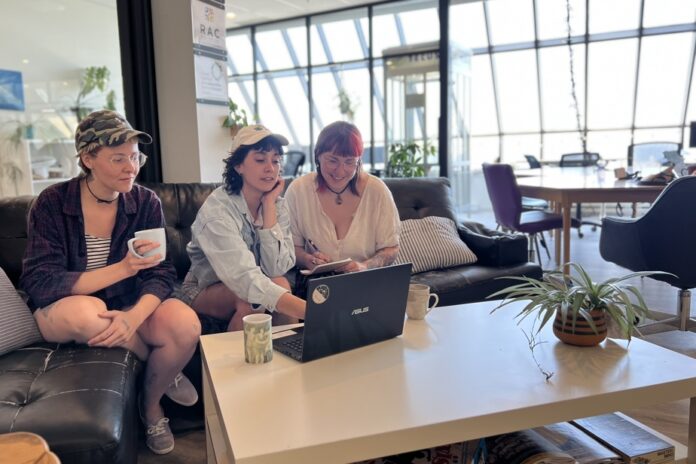Several major economic flagships in Quebec are cooperatives, such as Desjardins, Agropur or Beneva. But, small cooperatives continue to be created each year to meet specific needs in the communities.
When Camille Paquin left Montreal to settle in Rimouski in 2021, she was pleasantly surprised to see that she was quickly approached by artists who needed her expertise to complete grant applications. Then, during a videoconference training on the taxation of artists, she met Chantal Déry, of the Caisse de la culture Desjardins, who began to send her several new clients each month from all over Quebec. She also realized that artists often needed other complementary services. “I was still in self-employment mode, but I felt like I really needed to start a business,” she says.
This is how the Raquette coop was founded last October with Jowi Harvey and Audrey-Ann Allen, who had experience respectively in programming (booking) of artists and in the administration of cultural organizations.
“We want a non-hierarchical company that belongs to its members, its workers, explains Audrey-Ann Allen. The decision-making power is shared between us, whether in relation to the projects developed or the working conditions. We will drive our business forward according to our values and our vision. »
The challenges still exist.
Raquette obtained start-up funding from the Pôle d’économie sociale du Bas-Saint-Laurent. “But the fact remains that we worked hard on a voluntary basis to create the co-op,” she adds. Now we pay ourselves a salary for part-time work, when we work full time. We continue to work very hard to develop the coop so that soon it can give us working conditions at the expected level. And we believe that our voices united in a company will be stronger than our voices taken apart. »
Cooperative entrepreneurship continues to appeal to Quebecers: in 2021, no less than 82 cooperatives were created in the province.
“The new generation wants work that is consistent with its values, with its aspirations, and cooperatives stand out from other businesses because they are democratic and put people ahead of profits, so it’s interesting, especially in the current labor shortage,” notes Marie-Josée Paquette, Executive Director of the Conseil québécois de la coopération et de la mutualité, which supports the 12 sectoral federations of cooperatives present in Quebec.
However, since co-operatives operate in a democratic way, they may appear to move more slowly than private enterprises. “But this is also their strength, because once the debates have taken place and the decision is made, the support of the members is strong and this makes for more sustainable companies”, illustrates Marie-Josée Paquette.
Cooperatives also come to meet specific needs in living environments: providing care and services to seniors so they can stay at home longer, transforming the village grocery store into a cooperative to keep them alive , takeover of the boss’s company by a group of employees to convert it into a workers’ cooperative, etc.
We also see several cooperative market gardening farms emerging.
More and more companies are also creating cooperatives to pool services. For example, the online booking platform Ôrigine artisans hôteliers brings together around forty inns and independent hotels.
“We can also see companies in an industrial park create a cooperative to take care of recruiting labor for cross-functional jobs, particularly in accounting, or even companies in a region create a cooperative to house their foreign workers,” says Marie-Josée Paquette. The cooperative model can take different forms to meet the needs of a community. »





